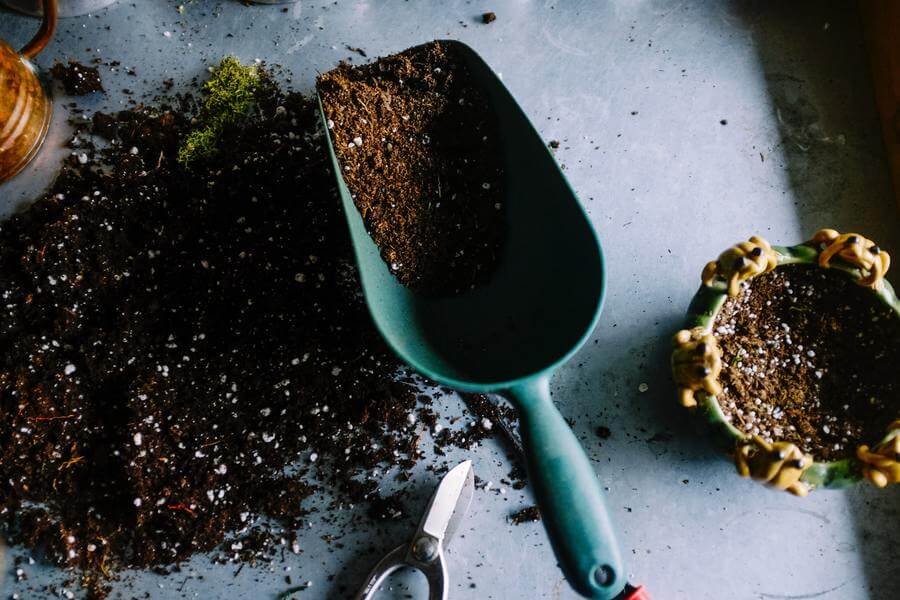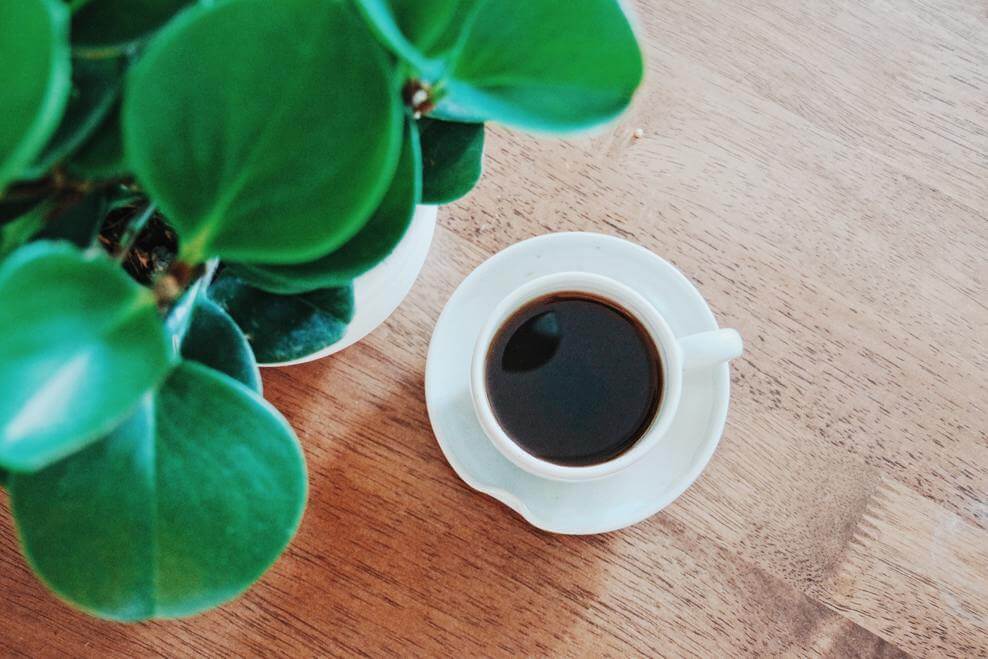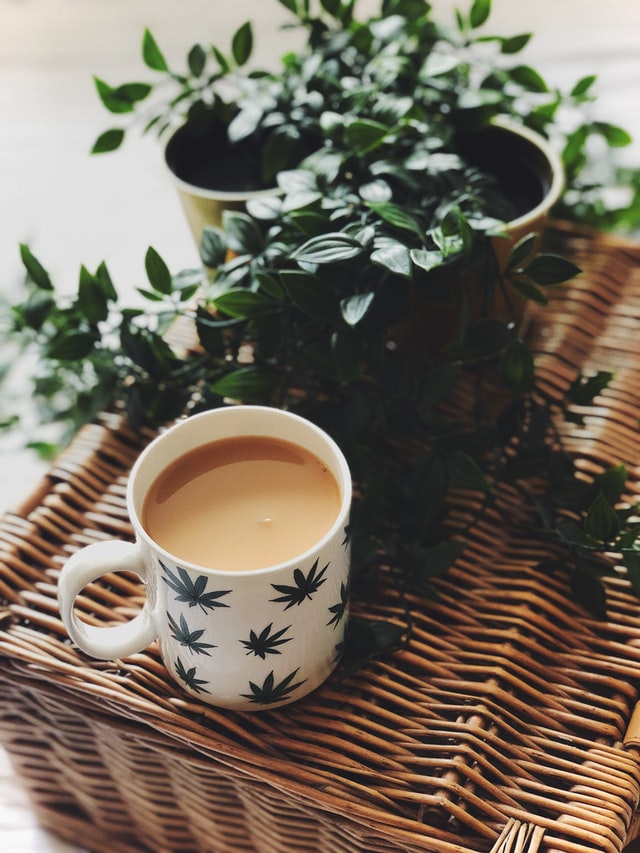Straight Answer: Coffee is good for your plants.
If you are a regular drinker of coffee in a coffee house, you have probably noticed that many of the chain shops and local coffee houses put out bags or boxes of used coffee grounds.
Have you ever wondered if the grounds can be used as a fertilizer for plants?
Yes, coffee grounds can be used as a fertilizer for plants. It is a good source of nitrogen in your compost pile, especially when added directly to the soil.
Coffee grounds too are effective in keeping away insects and pests that might be eating your plant.
This article is for you if you’re looking for natural ways to fertilize your plants using coffee!
Let’s get started!
What are the benefits of using coffee grounds for plants?
You already know coffee is rich in antioxidants and minerals that supply the human body with numerous health benefits. The same minerals are helpful for plants to grow.
Coffee grounds contain nitrogen, iron, phosphorus, and magnesium that help the plants in gaining the extra boost to promote their growth.
Moreover, the presence of the minerals may help in absorbing the heavy metals and protect the soil from contamination.
Also, you can use the ground as compost for the garden to help the soil in holding more nutrients and water.
A study published by the National Center for Biotechnology Information showed that the compost with coffee grounds and other kitchen wastes is proven to be rich in nutrients than the one made with only regular wastes.
That said, coffee provides huge benefits to plants!
Can coffee grounds be used as a mulch and a natural pesticide?
Surely coffee grounds can be used both as a mulch and a natural pesticide.
Mulching is incredibly beneficial for your garden and the use of coffee grounds can be a great addition to the compost at a low budget. However, the use of coffee grounds directly to the soil can be disastrous for some plants.
The reason behind this is mainly the caffeine content since it deters the germination of other plants.
The caffeine would fight for space, nutrients, and sunlight and eventually impede the growth of other plants. This is why add a substantial quantity of other organic matter like leafmold before using it on the soil.
For the purposes of composting, coffee grounds are considered to be ‘green’, or nitrogen-rich organic material and thus you need to balance them with ‘brown’ materials like dried leaves or newspaper.
Coffee grounds can also be used as a natural pesticide that would keep the slugs away.
Just spray a little bit of the solution of coffee grounds and water in the soil vulnerable to slugs and you will see the tiny creatures not crossing the region.
This happens because either the texture of the ground is abrasive and slugs do not want to cross them or they are just toxic for the tiny beings.
Which plants like coffee grounds?
Plants that thrive best in acidic soil prefer coffee grounds as a fertilizer.
Coffee grounds can be an amazing fertilizer, mulch, or compost for your plants and you can even water your plants using coffee. However, there is a limit to the quantity of coffee that can be used.
Remember that all plants do not grow well in acidic soils and too much caffeine may increase the risk of fungal diseases as well.
So pay attention to the type of plant you are growing on the soil and give coffee grounds accordingly.
Here is a list of some plants that will love the coffee grounds:
- roses
- blueberries
- azaleas
- cyclamen
- jade
- rhododendrons
- Christmas cactus
- African violets
- peach lilies
- hydrangeas
- radishes
All these are acid-loving plants and the addition of coffee grounds promotes their steady growth.
Tomato plants like slightly acidic soil but you’ll want to avoid using coffee grounds for steady growth. You shouldn’t use the grounds directly as a fertilizer too.
I suggest adding the grounds to the compost heap for later use instead.
Can I pour coffee on my plants?
You can water plants with coffee but do not forget to maintain a balance as too much caffeine is detrimental for both human beings and plants.
To avoid fungal diseases, opt for a liberal sprinkle of the liquid over the plants. Also, remember that only acid-loving plants are the option here.
Using coffee grounds as a fertilizer is not a new idea.
Gardeners have been using them in compost piles where it mixes with other organic substances and provides enriched food for plants. However, this is done with coffee grounds but not the cup of coffee you hold in the morning.
Mixing the grounds in the compost heap introduces microorganisms that help in breaking down and releasing nitrogen and also aids in lining weed seeds.
The huge amount of potassium and magnesium in the brewed drink helps in building blocks for plant growth. This is why the used grounds are the option for choosing as the fertilizer, not the fresh ones.
If you are having a cup with milk, cream or syrups then it is better to keep the coffee away from the soil. In this case, the sugar might not be the problem but the milk and cream additives will harm the plants.
Keep in mind to dilute or neutralize before watering plants with coffee and don’t add anything else to the mixture.
Do coffee grounds work as a fertilizer for plants?

Yes, it does!
As regular drinkers, many of us tend to dump the coffee remains in our waste bins but the coffee ground turns out to be a beneficial fertilizer for the plants both in-home and outside.
The number of nutrients present in the grounds may vary depending on the type of beans and method of preparation. But the presence of nitrogen, phosphorus, potassium, and other components has contributed to using the grounds as a slow-release fertilizer.
To use the coffee grounds as a fertilizer follow any of the convenient steps:
- Sprinkle them thinly on soil.
- Add them to the compost heap.
- Mix them effectively with either organic matter or soil.
- Make a solution with water and spray on the underside of the leaves.
- Balance the green coffee grounds with enough brown substances like leave or woody prunings.
All this time I was talking about used coffee grounds. The fresh ones may successfully suppress weeds and pathogens but the use of it won’t be beneficial for plants.
You need to be patient while using coffee as a dilute fertilizer since the process would take a while to show effects.
Remember to use the solution as a liquid fertilizer and not instead of water.
Will coffee kill plants?
It might shock you but it can.
Caffeine, a chemical stimulant present in coffee can disrupt the biological processes in not only humans but plants as well.
The breakdown in the normal physiological activities like photosynthesis and water absorption may restrain the normal growth in plants.
Moreover, the increase in acidity of the soil can be toxic for most of the plants even if it’s an acid-loving one.
The use of coffee grounds can act as a good fertilizer initially but after the caffeine begins to distort the cells, the plant stops growing and eventually die.
The N-methyltransferase gene is mutated in caffeine which creates a biological weapon. Thus this inhibits the germination of other plants when the coffee leaves fall to the ground.
Reports state that while coffee helped certain plants in surviving, they also simultaneously used the caffeine to cut down their competition.
People tend to form the idea that coffee grounds are reliable for any plant but this is not true. The increased acidity hinders the growth of many plants and so it should be kept in mind to neutralize or dilute with water to be used as a liquid fertilizer.
In terms of fertilizing the soil, coffee grounds do increase the fertility of the soil due to the presence of nitrogen content but it may affect the micro-organisms in soil as well.
This is why experts do not suggest relying on coffee grounds as plant food. Even if you are willing to use it, add it to the compost heap or dilute the content before adding it to the soil.
Which plants do not like coffee grounds?
Though coffee grounds help in fertilizing soil and promote the growth of some plants, they may also inhibit the growth of others like geranium, asparagus fern, etc.
It is true coffee grounds bear soil-friendly nutrients like nitrogen that help the plants. However, the coffee grounds are highly acidic and these should be used only for acid-loving plants.
Many soils tend to be acidic naturally and adding compost or fertilizers with the coffee ground may stunt the growth of fruits and flowers.
Below is a list of some plants that find the coffee grounds highly toxic:
- tomato
- Chinese mustard
- sago palm
- yucca
- lavender
- century plant
- rosemary
These plants don’t respond too well to the addition of coffee as a fertilizer due to varying reasons.
For example, the allopathic properties of the used coffee grounds restrain the growth of tomatoes.
The acidic coffee ground may be too harsh on the growth of these plants and impoverish the seed germination.
Those who claim that coffee grounds improve soil fertility are totally not wrong though. The effects of its use on plants are absolutely variable and diversified.
Can you spray coffee over plants?
You can prepare a foliar spray by steeping used coffee grounds.
This is mainly used on plants to spread a lingering coffee smell that prevents the pathogens from invading the plants.
The method is simple. You need to soak half a pound of used coffee grounds in water, approximately five liters and then just spray the solution to the underside of the leaves. This will deter the invaders from being appealing to the plants.
The efficacy of this spray definitely doesn’t serve as an organic fertilizer would do.
You can also use coffee grounds as a fertilizer sprinkle them thinly onto your soil. Make sure to balance the amount since your plants won’t like too much caffeine or acidity.
How to use coffee to water plants?
Remember that using diluted coffee for plants may increase the acidity of the soil.
Tap water is slightly alkaline so balance the texture of coffee grounds with water and don’t use this to water plants that do not like acidic soil.
Traditionally sulfur or decomposition of leaves are used to decrease soil pH levels but you can use the dilute coffee solution to perform this as well.
However, don’t overdo it and use plain water as well. Over usage of the diluted coffee fertilizer may sicken or dry the plants. This will cause the plants to die sooner.
If you notice yellow leaves then switch the plants in different containers and stop the coffee irrigation.
I have attached this short clip to demonstrate how to use coffee grounds on your plants. Give it a quick watch!
Is coffee powder good for plants?
‘Good’ is a relative term since whether the coffee powder will be beneficial for the plants or not will depend on the type of plant and their adaptability to the added powder in the soil.
But if you are wondering if you can add coffee powder to the soil for houseplants, then yes you can.
Coffee powder added to soil may work as a good repellent for insects. It can serve also as fertilizer as the used coffee grounds would do.
Just sprinkle the content on the soil or mix it with water. The nutrients and minerals serving will be the same as the used coffee grounds.
Also, remember that it acts very fast and is not long-lasting. So I would suggest you use the coffee powder only when you are in need of a quick pick-up on your plants.
Final Say on Is Coffee Good for Plants
In conclusion, using coffee grounds in your garden or outside has its share of pros and cons.
But yes, sprinkling coffee grounds on your plants is a good fertilizer.
Coffee also keeps certain pests away, alter the soil pH and supply important nutrients to the plants. Certain plants love the presence of coffee.
Moreover, by using your coffee grounds in the garden, you are being eco-friendly on many fronts.
However, the useful effects of the coffee grounds are completely variable and tough to call for all types of plants.
Tomato plants, for example, won’t react friendly to the caffeine content. Not only do the coffee grounds impede the plant’s growth but also may prevent the neighboring seeds from germinating in that soil.
The direct use of it will be a bigger problem and impede the yield of fruits and flowers. As a result for normal plants, the grounds need to be diluted with water at first to make them neutral.
Lastly, remember that coffee works well for many flowering plants and there is a possibility that the use of the dilute fertilizer will benefit many other plants as well.
Be careful about the amount you are using on your compost heap or in the spray bottle.
Other Articles
- Coffee Blend Recipes
- Can You Reuse Coffee Grounds?
- Double-Brewed Coffee (A Fascinating Read)
Contents
- 1 What are the benefits of using coffee grounds for plants?
- 2 Can coffee grounds be used as a mulch and a natural pesticide?
- 3 Which plants like coffee grounds?
- 4 Can I pour coffee on my plants?
- 5 Do coffee grounds work as a fertilizer for plants?
- 6 Will coffee kill plants?
- 7 Which plants do not like coffee grounds?
- 8 Can you spray coffee over plants?
- 9 How to use coffee to water plants?
- 10 Is coffee powder good for plants?
- 11 Final Say on Is Coffee Good for Plants
- 12 Other Articles


